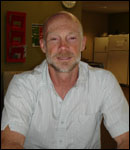Robert West

1. Have you worked in a research center before?
Robert West has worked in industry with pharmaceutical biotech for twenty years. He was originally trained in small molecular identification and worked in that capacity for some time in the east coast. Later he moved to Seattle and worked in a similar position in the company ZymoGenetics. Then, he got retrained to do protein biochemistry in the same company.
2. What is the difference between working in an industry rather than an institute?
“Work in a company or industry is generally trying to focus on coming up with a drug or device that is going to make money for that company. Normally, you have a fairly defined set of goals… The funding is different in a research institute, its generally soft money. You have to apply for grants and that’s going to determine your career path and in industry you have to prove your worth to the company…There’s a team effort in industry, where you have a role to play. In an institute, it’s kind of more independent, where a group has to do everything on their own without much support from facilities. They both have pros and cons.”
3. How is doing research in an academia setting different from doing research in an industrialized setting?
“Here you are trying to develop new tools. Your job is trying to develop new tools and not necessarily apply them…whereas [in industry], I would look at a problem and look at what is the best way to do it, I didn’t care if it was new technology or not. I wanted something that worked.”
4. What do you see yourself doing in the future?
Robert sees himself working at ISB in the future. He wants to write grants and do other things as well.
5. Do you think it matters that your background is in biology more or less in chemistry?
Yes. If you are trained in biology, you’re more likely to work in that field. For example, at ISB the Dudley lab is working with yeast and genetics, if a scientist like Robert wanted to work in that lab he would need a background in biology. “One of the attractive features about this institute is the fact that they look at and value all of the different disciplines.”
6. What is the hardest or most challenging part of your job?
The hardest thing was transitioning from an industrial setting to an academic one. There are many new things in an academic setting such as writing grants etc. that were new experiences that took time to adjust to.
7. Do you have any advice for future scientists?
“My advice would be to consider ‘what are the things that interest you?’ whether it’s physics, biology, or botany, geology.” Robert also mentioned Joseph Campbell, a famous writer, who once said, “Follow your bliss.”
|

